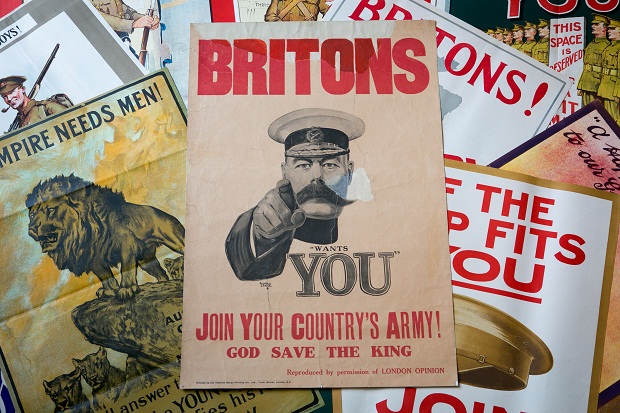This week’s issue is dated 2 August. On that date 100 years ago, my great-grandfather, Norman Moore (always known as ‘NM’), went to Sunday Mass. ‘Father Ryan,’ he noted in his diary, ‘seemed hardly to have thought of the war… I told [him] I felt uncertain whether August would be a good time for a mission to Protestants but I gave him the £5 I had promised.’ Later, he and his wife Milicent went to tea with their Sussex neighbours, Lord and Lady Ashton, who ‘seemed very little informed of the gravity of the situation’. Back at home, a telegram arrived from NM’s friend, Ethel Portal: ‘Germany occupied Luxembourg Reported repulse of Germans by French near Nancy unofficial.’ NM drove to pick up his younger son Gillachrist (‘Gilla’) from Robertsbridge station. On the platform, he heard a young man saying that England would not be drawn into the war, since she had no treaty with France. NM there wrote a telegram in Irish (a language of which he was a scholar) to thank Ethel for hers. The clerk came on to the platform and said: ‘“Is this telegram in code or cypher for we have orders not to send such?” No I said it is in Gaelic. I will read it to you & so I did and he was satisfied.’ The train arrived ten minutes late, a thing almost unheard of.
Gilla was on the train, and the family, including ‘all the men of the house of Moore’, gathered at Browns, an aunt’s house nearby. They included a cousin who had just sailed back across the Channel. He had caught a crammed train from Paris to the coast and ‘thought the French seemed depressed about the war and heard talk of the probability of defeat’. Then the Moores went back to NM’s house, Hancox, calling en route on Lord and Lady Ashton, who ‘grew more serious’ at the news of war. NM’s elder son, Alan (my grandfather), who was a doctor, spoke of joining the navy, or ‘if this impossible then the R.N. as a surgeon’. Gilla, who was 20 years old, was seeking a commission in the army.
The next morning after breakfast, Alan did the Sortes Virgilianae — the custom of opening the Aeneid and reading whatever lines present themselves, as auspices. He hit on line 622 of Book II, ‘apparent dirae facies inimicaque Trojae’. The lines noted in NM’s diary translate as follows: ‘Dreadful shapes appeared,/ and the vast powers of gods opposed to Troy./ Then in truth all Ilium seemed to me to sink in flames,/ and Neptune’s Troy was toppled from her base:/ just as when foresters on the mountain heights/ compete to uproot an ancient ash tree, struck/ time and again by axe and blade, it threatens continually/ to fall, with trembling foliage and shivering crown,/ till gradually vanquished by the blows it groans at last,/ and torn from the ridge, crashes down in ruin.’ ‘A melancholy Sors indeed,’ wrote NM. Alan and Gilla left for London, to arrange their war service.
This article first appeared in the print edition of The Spectator magazine, dated 2 August 2014.







Comments